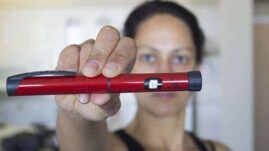Having blood sugar out of range for too long can be dangerous. Over time, both low and high blood sugar levels can cause diabetes complications.
But what is considered high blood sugar, and how can you manage and prevent high blood sugar levels?
This article will explore everything you need to know about high blood sugar levels.

Table of Contents
- What are the causes of high blood sugar?
- What are the symptoms of high blood sugar?
- What is considered high blood sugar?
- What are the consequences of high blood sugar?
- How can you prevent high blood sugar?
- At what level does high blood sugar become dangerous?
- Can high blood sugar be deadly?
- How can I bring my blood sugar down quickly?
What are the causes of high blood sugar?
Many things can cause high blood sugar.
The main cause is that the pancreas either does not make enough insulin or makes no insulin, depending on what type of diabetes you have.
People with diabetes may experience high blood sugar for the following reasons:
- Too little insulin taken for food eaten
- Skipping an insulin dose
- Skipping other diabetes medications
- Taking an incorrect dose of insulin
- An insulin pump malfunction
- A continuous glucose monitor (CGM) malfunction
- Taking expired insulin
- Rationing insulin
- Hormonal changes
- Stress
- Too little sleep
- Lack of exercise
- Dehydration
- Taking certain medications (such as steroids)
- Being sick or fighting off an infection
- Too much food eaten
- Snacking
- Miscalculating carbohydrates in a meal
- Drinking caffeine
- Dawn Phenomenon
- Insulin resistance changing, due to weight gain, or pregnancy
There are many causes of high blood sugar, and everyone is different!
Some things that may trigger a blood sugar spike in some people may not affect you at all.
What are the symptoms of high blood sugar?
If you live with diabetes, always be aware of the symptoms of high blood sugar in order to bring your levels back into a normal range.
Early symptoms of high blood sugar include:
- Extreme thirst
- Polyuria (frequent urination)
- Dry mouth
- Fatigue
- Headache
- Achy muscles
- Slight changes to vision
Symptoms of prolonged high blood sugar include:
- Nausea
- Vomiting
- Blurry vision
- Fruity-smelling breath
- Confusion
- Weight loss
- Flushed face
- DKA and coma
Symptoms such as thirst, frequent urination, and dry mouth occur more quickly.
Whereas symptoms such as weight loss and blurry vision usually occur after experiencing high blood sugar for days or even weeks.
Call your doctor or 911 if you’re experiencing severe symptoms of high blood sugar, are testing positive for ketones, and are unable to bring your blood sugar down after several hours or days.
This will help prevent the onset of diabetic ketoacidosis (DKA), which could be fatal if not treated promptly by medical professionals.
What is considered high blood sugar?
This will depend on the person, as everyone has different health goals and lifestyles.
A fasting blood sugar level is considered to be in the diabetic range if it is 125 mg/dL or higher.
However, many people with diabetes prefer their blood sugars to be a little higher than that, especially if they struggle with hypo unawareness, exercise frequently, are older, or live alone.
Some people may prefer to keep their blood sugars lower, especially if they are pregnant or trying to lower their A1C.
Pregnant women with diabetes are encouraged to keep their blood sugar levels within a tighter range and never any higher than 140 mg/dL, even one hour after a meal.
Most people with diabetes will begin to feel symptomatic for high blood sugar between 180-200 mg/dL.
Blood sugars over 200 mg/dL should be treated promptly with insulin.
Any blood sugar over 250 mg/dL should warrant a urine test for ketones to rule out diabetic ketoacidosis (DKA).
DKA is a dangerous acute complication of diabetes that can be fatal if not treated quickly.
Seek medical attention immediately if you’re experiencing a blood sugar higher than 250 mg/dL for several hours along with moderate to high ketones and you’re struggling to get your blood sugar down.
People with diabetes are at risk of falling into a diabetic coma once their blood sugar reaches 600 mg/dL or higher with ketones.
At this point, you may also experience diabetic hyperosmolar syndrome or DKA.
In both instances, your body dehydrates necessary electrolytes and hydration through your urine, which may lead to death.
Blood sugars that are this high require immediate medical attention.
What are the consequences of high blood sugar?
Unfortunately, there are many consequences of high blood sugar.
However, this isn’t something that should scare you.
People with diabetes all experience high blood sugar from time to time, and this isn’t something that you should blame yourself for.
Short-term consequences
In the short term, high blood sugar can make you thirsty and may make you dehydrated due to frequent urination.
High blood sugar can also make you lose weight and may worsen your vision.
You’ll feel achy and tired. If you have wounds, they may heal more slowly and you’ll be more prone to infection.
Additionally, high blood sugar puts you at a higher risk of developing diabetic ketoacidosis (DKA), which is where ketones overflow into the blood and urine, turning your blood acidic.
This can be fatal if not treated quickly by medical professionals.
Long-term consequences
Additionally, over prolonged periods of time, high blood sugar (over 200-250 mg/dL) can and will cause diabetes complications in most people.
These complications can take years and even sometimes decades to develop. They include:
- Retinopathy (damage to the retina of the eye)
- Blindness
- Neuropathy (nerve damage)
- Lower-limb amputations
- Kidney damage
- Heart disease/heart attack
- Stroke
- Shortened life expectancy
How can you prevent high blood sugar?
It is nearly impossible to avoid all high blood sugar levels if you live with diabetes.
However, there are many things you can do to help prevent many instances of high blood sugar.
Some of these strategies include:
- Count carbohydrates and take medications accordingly.
- Focus on eating protein and vegetables as the main building blocks of all meals.
- Only drink water and never sugar-sweetened beverages.
- Stay hydrated.
- Never use expired insulin (always check expiration dates!)
- Do not ration your insulin.
- Always take your medications as prescribed.
- Get regular exercise.
- Aim for between 7-9 hours of sleep per night.
- Check your blood sugars regularly (multiple times per day.)
- Go to your doctor regularly for check-ups.
- Be aggressive in treating high blood sugar to help prevent DKA.
At what level does high blood sugar become dangerous?
High blood sugar at any level can be dangerous, especially if you’re pregnant.
However, most people are symptomatic at around 180-200 mg/dL, and many people start developing ketones at 250 mg/dL or higher.
Ketones and high blood sugar put you at high risk for diabetic ketoacidosis (DKA), which is very dangerous and can be fatal.
You are at high risk of falling into a diabetic coma once your blood sugar hits 600 mg/dL or higher, which could lead to irreversible brain damage and death.
However, even moderately higher blood sugars (around 200 mg/dL or so) over many years can be dangerous and contribute to diabetes complications like blindness, nerve damage, kidney disease, heart disease, and a lower life expectancy.
This video provides a great overview of when high blood sugar becomes dangerous, and what you can do to get your blood sugar down:
Can high blood sugar be deadly?
Unfortunately, yes. Exceedingly high blood sugar levels can lead to diabetic hyperosmolar syndrome, diabetic ketoacidosis (DKA), brain swelling, dehydration, coma, and death.
It is important to always check your blood sugar levels often and bring down any high blood sugar levels quickly, especially before you develop ketones.
How can I bring my blood sugar down quickly?
If you are insulin-dependent, taking insulin is the fastest way to bring your blood sugar down.
Additionally, if you’re experiencing insulin resistance and high blood sugar (due to hormonal changes or a fatty meal you’ve recently eaten) making sure you’re not dehydrated can help lower blood sugar levels.
Drink lots of water! Dehydration affects blood sugar levels.
Finally, getting a little exercise can help lower blood sugars more quickly. Even just a 15–20 minute walk will help lower your blood sugar faster.
Read more: How to Bring High Blood Sugar Down Quickly




Tammy
My Dr has been working with me to get my A1C down it’s at 11.1 añd I’ve been struggling to lower it but I don’t know what I’m doing wrong it isn’t budgeing and it’s frustrating any advice?
Christel Oerum, MS
There can be a lot of reasons why it’s a struggle. If you can, try getting a CGM. That will allow you to see your blood sugars 24/7 and give a more comprehensive view of what’s going on. You can also learn different tips in this video: https://youtu.be/k-AfKq-CPc8?si=bkVHI2Tm_Vs9vEA-